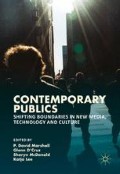Abstract
In May 2013, Edward Snowden leaked to The Guardian commodification of personal details of global digital surveillance programs orchestrated by intelligence agencies in the USA and United Kingdom. By making public the existence of PRISM, XKeyScore, Boundless Informant, and other programs, Snowden did more than prove the breadth and pervasiveness of intelligence operations. His act gave radically distinct form to social bodies known, defined, and constituted by their very monitoring: surveillance publics. To date, surveillance studies has tended to focus analysis on the technical aspects of surveillances, its effects at a societal level, or the operation of complex, multi-layered “surveillant assemblages” (Haggerty and Ericson, British Journal of Sociology 51(4): 605–622, 2000) formed by the practices state and non-state actors. Taking up threads from each of these approaches, this chapter maps the vectors of state surveillance and traces their complex fields of relations to everyday life. Manuel DeLanda’s (A new philosophy of society: Assemblage theory and social complexity. London: Continuum, 2006) social assemblage theory provides the framework for understanding state surveillance and its relationship to individuals, while Brian Massumi’s (2012) work on the ontology of events offers an understanding of Snowden’s making public as not simply a discursive act but the assembling of new relations, affects, and forces. Linking everyday practices of individuals and collectives to the processes of leaked surveillance programs, this essay asks how publics might be understood once the secrets of their near-ubiquitous surveillance are made known.
Access this chapter
Tax calculation will be finalised at checkout
Purchases are for personal use only
Bibliography
Agamben, Giorgio. 2005. State of Exception. Trans. Kevin Attell. Chicago: University of Chicago Press. Original edition, Stato di eccezione, 2003 Bollati Boringhiere editore s.r.l., Torino.
Ahmed, Sara. 2004. The cultural politics of emotion. New York: Routledge.
Anderson, Ben. 2009. Affective atmospheres. Emotion, Space and Society 2(2): 77–81. doi:http://dx.doi.org/10.1016/j.emospa.2009.08.005
Angus Reid Global. 2013. More Canadians, Britons & Americans view Edward Snowden as ‘hero’ than ‘traitor.’ Angus Reid Global, October 30. http://www.angusreidglobal.com/wp-content/uploads/2013/10/2013.10.30-Snowden-Leaks.pdf. Accessed 20 Feb 2014.
Bauman, Zygmunt, Didier Bigo, Paulo Esteves, Elspeth Guild, Vivienne Jabri, David Lyon, and R.B.J. Walker. 2014. After Snowden: Rethinking the impact of surveillance. International Political Sociology 8(2): 121–144. doi:10.1111/ips.12048.
DeLanda, Manuel. 2006. A new philosophy of society: Assemblage theory and social complexity. London: Continuum.
Deleuze, Gilles. 1992. Postscript on the socities of control. October 59: 3–7.
Deleuze, Gilles, and Felix Guattari. 1987. A Thousand Plateaus: Capitalism and Schizophrenia. Trans. Brian Massumi. Minneapolis: University of Minnesota Press.
Dijstelbloem, Huub, and Dennis Broeders. 2015. Border surveillance, mobility management and the shaping of non-publics in Europe. European Journal of Social Theory 18(1): 21–38. doi:10.1177/1368431014534353.
Ellis, Darren, Ian Tucker, and David Harper. 2013. The affective atmospheres of surveillance. Theory & Psychology 23(6): 716–731. doi:10.1177/0959354313496604.
Foucault, Michel. 1977. Discipline and Punish: The Birth of the Prison. Trans. Allan Sheridan. New York: Pantheon Books.
Greenwald, Glenn. 2014. No place to hide: Edward Snowden, the NSA and the US surveillance state. London: Penguin.
Greenwald, Glenn, and Laura Poitras. 2013. Edward Snowden: ‘The US government will say I aided our enemies.’ Video Interview. The Guardian (online). June 6. http://www.theguardian.com/world/video/2013/jul/08/edward-snowden-video-interview. Accessed 20 Feb 2014.
Haggerty, Kevin D., and Richard V. Ericson. 2000. The surveillant assemblage. British Journal of Sociology 51(4): 605–622. doi:10.1080/00071310020015280.
Lucas, George R., Jr. 2014. NSA management directive #424: Secrecy and privacy in the aftermath of Edward Snowden. Ethics & International Affairs 28(1): 29–-38.
Lyon, David. 1994. The electronic eye: The rise of the surveillance society. Minneapolis: University of Minnesota Press.
———. 2003. Surveillance as social sorting: Privacy, risk and automated discrimination. London: Routledge.
———. 2007. Surveillance studies: An overview. Cambridge: Polity.
———. 2014. Surveillance, Snowden, and big data: Capacities, consequences, critique, vol. 1.
———. 2014. Surveillance, Snowden, and Big Data: Capacities, Consequences, Critiques. Big Data and Society, 1(2): 1–13. doi: 10.1177/2053951714541861
Martin, Aaron K., and Kevin P. Donovan. 2014. New surveillance technologies and their publics: A case of biometrics. Public Understanding of Science. Published online before print February 6, 2014. doi:10.1177/0963662513514173.
Massumi, Brian. 2007. Potential politics and the primacy of preemption. Theory & Event 10(2). Accessed 1 Aug 2014. doi:10.1353/tae.2007.0066.
———. 2010. The future birth of the affective fact: The political ontology of threat. In The affect theory reader, eds. Melissa Gregg, and Gregory J. Seigwort, 52–70. Durham: Duke University Press.
Murakami Wood, David. 2009. The ‘surveillance society’: Questions of history, place and culture. European Journal of Criminology 6(2): 179–194. doi:10.1177/ 1477370808100545.
Murakami Wood, David, and C.William.R. Webster. 2009. Living in surveillance societies: The normalisation of surveillance in Europe and the threat of Britain’s bad example. Journal of Contemporary European Research 5(2): 259–273.
Murakami Wood, David, C. William, and R. Webster. 2011. The normality of living in surveillance societies. In Innovating government normative, policy and technological dimensions of modern government, eds. Simone van der Hof, and Marga M. Groothuis, 151–164. The Hague: T.M.C. Asser Press.
Passavant, Paul A. 2005. The strong neo-liberal state: Crime, consumption, governance. Theory & Event 8(3). Accessed 1 Aug 2014. https://muse.jhu.edu/journals/theory_and_event/v008/8.3passavant.html
Perlroth, Nicole. 2014. The day the Internet didn’t fight back. Bits. New York Times, February 11. http://bits.blogs.nytimes.com/2014/02/11/the-day-the-internet-didnt-fight-back/?_php=true&_type=blogs&_php=true&_type=blogs&_r=3&. Accessed 20 Feb 2014.
Robertson, Adi. 2014. Not many of us actually fought on the day we fight back. The Verge. February 13. http://www.theverge.com/2014/2/13/5408034/not-many-of-us-actually-fought-on-the-day-we-fight-back. Accessed 20 Feb 2014.
Tucker, Ian. 2013. Bodies and surveillance: Simondon, information and affect. Distinktion: Scandinavian Journal of Social Theory 14(1): 30–41. doi:10.1080/1600910X.2013.766225.
Warner, Michael. 2002. Publics and counterpublics. Public Culture 14(1): 49–90. doi:10.1215/08992363-14-1-49.
Author information
Authors and Affiliations
Editor information
Editors and Affiliations
Copyright information
© 2016 The Author(s)
About this chapter
Cite this chapter
Richardson, M. (2016). Surveillance Publics After Edward Snowden. In: Marshall, P., D'Cruz, G., McDonald, S., Lee, K. (eds) Contemporary Publics. Palgrave Macmillan, London. https://doi.org/10.1057/978-1-137-53324-1_11
Download citation
DOI: https://doi.org/10.1057/978-1-137-53324-1_11
Published:
Publisher Name: Palgrave Macmillan, London
Print ISBN: 978-1-137-53323-4
Online ISBN: 978-1-137-53324-1
eBook Packages: Literature, Cultural and Media StudiesLiterature, Cultural and Media Studies (R0)

